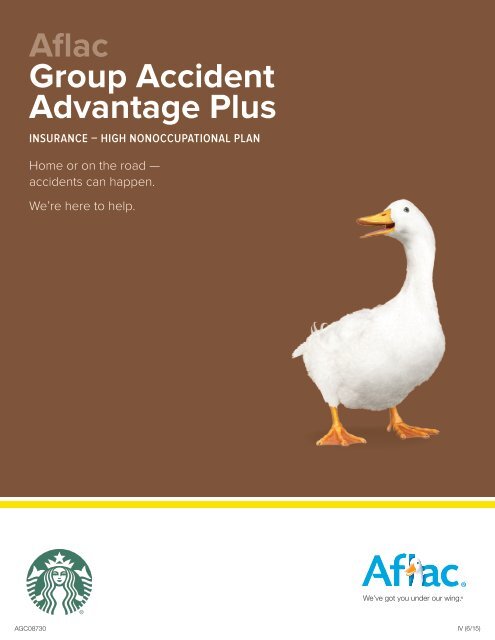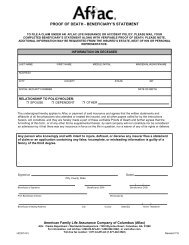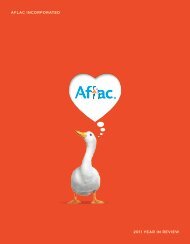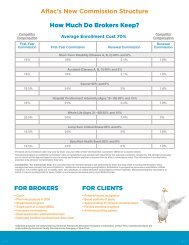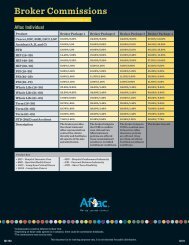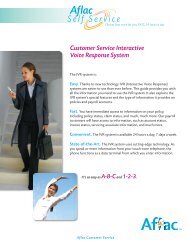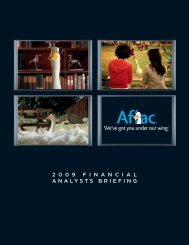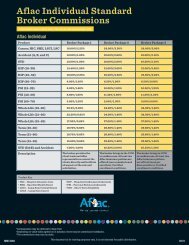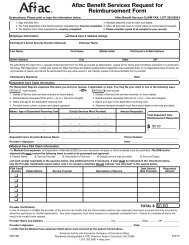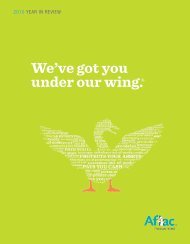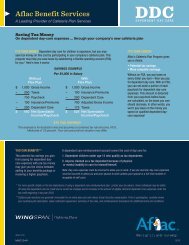Aflac Group Accident Advantage Plus
Peace of Mind and Real Cash Benefits - Aflac
Peace of Mind and Real Cash Benefits - Aflac
- No tags were found...
You also want an ePaper? Increase the reach of your titles
YUMPU automatically turns print PDFs into web optimized ePapers that Google loves.
<strong>Aflac</strong><br />
<strong>Group</strong> <strong>Accident</strong><br />
<strong>Advantage</strong> <strong>Plus</strong><br />
INSURANCE – HIGH NONOCCUPATIONAL PLAN<br />
Home or on the road —<br />
accidents can happen.<br />
We’re here to help.<br />
AGC08730<br />
IV (6/15)
AFLAC GROUP ACCIDENT ADVANTAGE<br />
PLUS INSURANCE<br />
GROUP ACCIDENTAL INJURY INSURANCE – HIGH NONOCCUPATIONAL PLAN<br />
Policy Series CAI7800<br />
AC G<br />
Introducing added protection for life’s<br />
unexpected moments.<br />
According to the National Safety Council, 43% of all medically consulted injuries occur<br />
at home. In fact, 1 in every 14 people in the United States experience an unintentional<br />
injury at home serious enough to consult with a medical professional. 1 If you’re like<br />
most people, you don’t budget for life’s unexpected moments.<br />
But at some point, you may make an unexpected trip to your local emergency room.<br />
And that could add a set of unexpected bills into the mix.<br />
That’s the benefit of the <strong>Aflac</strong> group <strong>Accident</strong> <strong>Advantage</strong> <strong>Plus</strong> plan.<br />
In the event of a covered accident, the plan pays cash benefits fast to help with the<br />
costs associated with out-of-pocket expenses and bills—expenses major medical may<br />
not take care of, including:<br />
• Ambulance rides.<br />
• Wheelchairs, crutches,<br />
and other medical appliances.<br />
• Emergency room visits.<br />
• Surgery and anesthesia.<br />
• Bandages, stitches, and casts.<br />
Understanding the facts can help you decide if the <strong>Aflac</strong><br />
group <strong>Accident</strong> <strong>Advantage</strong> <strong>Plus</strong> plan makes sense for you.<br />
FACT NO. 1<br />
39.4MILLION<br />
OF VISITS TO HOSPITAL EMERGENCY DEPARTMENTS<br />
IN 2007 WERE DUE TO INJURIES. 1<br />
FACT NO. 2<br />
63.1 %<br />
OF ALL INJURY EPISODES AMONG CHILDREN UNDER<br />
THE AGE OF 12 WERE DUE TO SPORTS AND LEISURE. 1<br />
1<br />
National Safety Council, Injury Facts, 2011 Edition<br />
Underwritten by Continental American Insurance Company (CAIC)<br />
A proud member of the <strong>Aflac</strong> family of insurers
Here’s why the<br />
<strong>Aflac</strong> group <strong>Accident</strong><br />
<strong>Advantage</strong> <strong>Plus</strong> plan<br />
may be right for you.<br />
For almost 60 years, <strong>Aflac</strong> has been dedicated to helping provide individuals<br />
and families peace of mind and financial security when they’ve needed it most.<br />
Our group <strong>Accident</strong> <strong>Advantage</strong> <strong>Plus</strong> plan is just another innovative way to help<br />
make sure you’re well protected under our wing.<br />
But it doesn’t stop there. The group <strong>Accident</strong> <strong>Advantage</strong> <strong>Plus</strong> plan from <strong>Aflac</strong> means that your<br />
family has access to added financial resources to help with the cost of follow-up care as well.<br />
The <strong>Aflac</strong> group <strong>Accident</strong> <strong>Advantage</strong> <strong>Plus</strong> plan benefits:<br />
• Transportation and Lodging benefits<br />
• An Emergency Room Treatment Benefit<br />
• A Rehabilitation Unit Benefit<br />
• Coverage for certain serious conditions, such as coma and paralysis<br />
• An <strong>Accident</strong>al-Death Benefit<br />
• A Dismemberment Benefit<br />
Features:<br />
• Coverage is guaranteed-issue (which means you may qualify for coverage without having<br />
to answer health questions).<br />
• Benefits are paid directly to you unless you choose otherwise.<br />
• Coverage is available for you, your spouse, and dependent children.<br />
• Coverage is portable (with certain stipulations). That means you can take it with you if you<br />
change jobs or retire.<br />
• Fast claims payment. Most claims are processed in about four business days.<br />
How it works<br />
<strong>Aflac</strong> group<br />
<strong>Accident</strong><br />
<strong>Advantage</strong> <strong>Plus</strong><br />
High plan is<br />
selected.<br />
You injure your<br />
leg in a covered<br />
accident and go<br />
to the hospital via<br />
ambulance.<br />
The emergency<br />
room doctor<br />
diagnoses a<br />
fracture and<br />
treats you.<br />
You leave the<br />
hospital on<br />
crutches.<br />
The <strong>Aflac</strong> group <strong>Accident</strong> <strong>Advantage</strong> <strong>Plus</strong> High Plan pays:<br />
$2,930<br />
Amount payable was generated based on benefit amounts for: Closed-Reduction Leg Fracture ($2,400),<br />
Emergency Room Treatment ($200), one Follow-Up Treatment ($30), Ambulance ($200) and Appliance ($100)<br />
The plan has limitations and exclusions that may affect benefits payable. This brochure is for illustrative purposes only.<br />
Refer to your certificate for complete details, definitions, limitations, and exclusions.<br />
For more information, ask your insurance agent/producer, call 1.800.433.3036, or visit aflacgroupinsurance.com.
Benefits Overview<br />
HOSPITAL BENEFITS EMPLOYEE SPOUSE CHILD<br />
HOSPITAL ADMISSION<br />
We will pay the amount shown, when because of a covered accident, you are<br />
injured, require hospital confinement, and are confined to a hospital for at least<br />
24 hours within one year after the accident date. We will pay this benefit once per<br />
calendar year. We will not pay this benefit for confinement to an observation unit.<br />
We will not pay this benefit for emergency room treatment or outpatient surgery or<br />
treatment.<br />
$1,000 $1,000 $1,000<br />
HOSPITAL CONFINEMENT (per day)<br />
We will pay the amount shown when, because of a covered accident, you are<br />
injured and those injuries cause confinement to a hospital for at least 24 hours<br />
within one year after the accident date.<br />
The maximum period for which you can collect the Hospital Confinement<br />
Benefit for the same injury is 365 days. This benefit is payable once per hospital<br />
confinement even if the confinement is caused by more than one accidental injury.<br />
$200 $200 $200<br />
We will not pay this benefit for confinement to an observation unit. We will not pay<br />
this benefit for emergency room treatment or outpatient surgery or treatment.<br />
HOSPITAL INTENSIVE CARE (per day)<br />
We will pay the amount shown when, because of a covered accident, you are<br />
injured, and those injuries cause confinement to a hospital intensive care unit.<br />
This benefit is paid up to 30 days per covered accident. Benefits are paid in addition<br />
to the Hospital Confinement Benefit.<br />
$400 $400 $400<br />
MEDICAL FEES (for each accident)<br />
We will pay up to the amount shown for X-rays and doctor services when, because<br />
of a covered accident, you are injured and those injuries cause you to receive initial<br />
treatment from a doctor within one year after the accident.<br />
If you do not exhaust the maximum benefit paid during the initial treatment, we will<br />
pay the remainder of this benefit for treatment received due to injuries from a covered<br />
accident and for each covered accident up to one year after the accident date.<br />
$125 $125 $75<br />
PARALYSIS (lasting 90 days or more and diagnosed by a physician within one year)<br />
Quadriplegia<br />
Paraplegia<br />
$10,000 $10,000 $10,000<br />
$5,000 $5,000 $5,000<br />
Paralysis means the permanent loss of movement of two or more limbs. We<br />
will pay the appropriate amount shown if, because of a covered accident, you<br />
are injured, the injury causes paralysis which lasts more than 90 days, and the<br />
paralysis is diagnosed by a doctor within one year after the accident.<br />
The amount paid will be based on the number of limbs paralyzed. If this benefit<br />
is paid and you later die as a result of the same covered accident, we will pay the<br />
appropriate Death Benefit, less any amounts paid under the Paralysis Benefit.<br />
The plan has limitations and exclusions that may affect benefits payable.<br />
This brochure is for illustrative purposes only. Refer to your certificate for complete details, definitions, limitations, and exclusions.
ACCIDENTAL-DEATH AND -DISMEMBERMENT (within one year) EMPLOYEE SPOUSE CHILD<br />
ACCIDENTAL-DEATH $50,000 $25,000 $5,000<br />
ACCIDENTAL COMMON-CARRIER DEATH (plane, train, boat, or ship) $100,000 $50,000 $15,000<br />
SINGLE DISMEMBERMENT $12,500 $5,000 $2,500<br />
DOUBLE DISMEMBERMENT $25,000 $10,000 $5,000<br />
LOSS OF ONE OR MORE FINGERS OR TOES $1,250 $500 $250<br />
PARTIAL AMPUTATION OF FINGERS OR TOES (including at least one joint) $100 $100 $100<br />
If the <strong>Accident</strong>al Common-Carrier Death Benefit is paid, we will pay the <strong>Accident</strong>al-Death Benefit.<br />
<strong>Accident</strong>al-Death Benefit<br />
We will pay the amount shown if, because of a covered accident, you are injured, and the injury causes you to die within<br />
one year after the accident.<br />
<strong>Accident</strong>al Common-Carrier Death Benefit<br />
We will pay the amount shown if you are a fare-paying passenger on a common carrier, as defined below, are injured<br />
in a covered accident, and die within one year after the covered accident.<br />
We will pay the <strong>Accident</strong>al-Death Benefit in addition to the <strong>Accident</strong>al Common-Carrier Death Benefit.<br />
Dismemberment Benefit<br />
We will pay the appropriate amount shown if, because of a covered accident, you are injured and lose a hand, a foot, or sight within<br />
one year after the accident as a result of the injury. If you lose one hand, one foot, or the sight of one eye in a covered accident, we<br />
will pay the single dismemberment benefit shown. If you lose both hands, both feet, the sight of both eyes, or a combination of any<br />
two, we will pay the double dismemberment benefit shown. If you lose one or more fingers or toes in a covered accident, we will pay<br />
the finger/toe benefit shown.<br />
If the Dismemberment Benefit is paid and you later die as a result of the same covered accident, we will pay the appropriate death<br />
benefit, less any amounts paid under this benefit.<br />
MAJOR INJURIES (diagnosis and treatment within one year)<br />
EMPLOYEE/<br />
SPOUSE/CHILDREN<br />
FRACTURES (closed reduction)<br />
Hip/Thigh $4,000<br />
Vertebrae (except processes) $3,600<br />
Pelvis $3,200<br />
Skull (depressed) $3,000<br />
Leg $2,400<br />
Forearm/Hand/Wrist $2,000<br />
Foot/Ankle/Kneecap $2,000<br />
Shoulder Blade/Collar Bone $1,600<br />
Lower Jaw (mandible) $1,600<br />
Skull (simple) $1,400<br />
Upper Arm/Upper Jaw $1,400<br />
Facial Bones (except teeth) $1,200<br />
Vertebral Processes $800<br />
Fracture* is a break in the bone that<br />
can be seen by X-ray. If a bone is<br />
fractured in a covered accident, we<br />
will pay the appropriate benefit shown.<br />
Multiple fractures* means having<br />
more than one fracture requiring open<br />
or closed reduction. If these fractures<br />
occur in any one covered accident,<br />
we will pay the appropriate benefits<br />
shown for each fracture, but no more<br />
than double the amount for the bone<br />
fractured that has the highest benefit<br />
amount.<br />
Chip fracture* means a piece of<br />
bone that is completely broken off<br />
near a joint. If a doctor diagnoses a<br />
chip fracture, we will pay 25% of the<br />
appropriate benefit shown.<br />
*If a fracture requires open reduction,<br />
we will pay double the amount shown.<br />
Coccyx/Rib/Finger/Toe $320<br />
The plan has limitations and exclusions that may affect benefits payable.<br />
This brochure is for illustrative purposes only. Refer to your certificate for complete details, definitions, limitations, and exclusions.
Benefits Overview<br />
MAJOR INJURIES – continued<br />
EMPLOYEE/<br />
SPOUSE/CHILDREN<br />
DISLOCATIONS (closed reduction)<br />
Hip $3,000<br />
Knee (not kneecap) $1,950<br />
Shoulder $1,500<br />
Foot/Ankle $1,200<br />
Hand $1,050<br />
Lower Jaw $900<br />
Wrist $750<br />
Elbow $600<br />
Finger/Toe $240<br />
SPECIFIC INJURIES<br />
Dislocation* means a completely<br />
separated joint. If a doctor diagnoses and<br />
treats the dislocation within 90 days after<br />
the covered accident, we will pay the<br />
amount shown. If the dislocation requires<br />
open reduction, we will pay 200% of the<br />
appropriate amount shown.<br />
Multiple Dislocations* means having<br />
more than one dislocation requiring<br />
either open or closed reduction. For each<br />
dislocation, we will pay the amounts<br />
shown. We will not pay more than 200%<br />
of the benefit amount for the dislocated<br />
joint that has the highest benefit amount.<br />
Partial dislocation* means the<br />
joint is not completely separated. If a<br />
doctor diagnoses and treats the partial<br />
dislocation, we will pay 25% of the<br />
amount shown for the affected joint.<br />
* If a dislocation requires open reduction,<br />
we will pay double the amount shown.<br />
EMPLOYEE/<br />
SPOUSE/CHILDREN<br />
RUPTURED DISC (treatment within one year; surgical repair within one year)<br />
Injury occurring during first certificate year $100<br />
Injury occurring after first certificate year $400<br />
TENDONS/LIGAMENTS (treatment within one year; surgical repair within one year)<br />
If you tear, sever, or rupture a tendon or ligament in a covered accident, we will pay one benefit. We will<br />
pay the largest of the scheduled benefit amounts for tendons and ligaments repaired.<br />
$600<br />
(Multiple)<br />
$400<br />
(Single)<br />
TORN KNEE CARTILAGE (treatment within one year; surgical repair within one year)<br />
Injury occurring during first certificate year $100<br />
Injury occurring after first certificate year $400<br />
EYE INJURIES<br />
Treatment and surgical repair within one year $250<br />
Removal of foreign body nonsurgically, with or without anesthesia $50<br />
The plan has limitations and exclusions that may affect benefits payable.<br />
This brochure is for illustrative purposes only. Refer to your certificate for complete details, definitions, limitations, and exclusions.
SPECIFIC INJURIES<br />
CONCUSSION<br />
A concussion or mild traumatic brain injury (MTBI) is defined as a disruption of brain function resulting<br />
from a traumatic blow to the head.<br />
COMA<br />
Coma means a state of profound unconsciousness caused by a covered accident. If you are in a coma<br />
lasting 30 days or more as the result of a covered accident, we will pay the benefit shown.<br />
EMPLOYEE/<br />
SPOUSE/CHILDREN<br />
$200<br />
$10,000<br />
EMERGENCY DENTAL WORK (per accident; injury to sound, natural teeth)<br />
Repaired with crown $150<br />
Resulting in extraction $50<br />
BURNS (treatment within one year and based on percentage of body surface burned)<br />
Second-Degree Burns<br />
Less than 10% $100<br />
At least 10%, but less than 25% $200<br />
At least 25%, but less than 35% $500<br />
35% or more $1,000<br />
Third-Degree Burns<br />
Less than 10% $1,000<br />
At least 10%, but less than 25% $5,000<br />
At least 25%, but less than 35% $10,000<br />
35% or more $20,000<br />
First-degree burns are not covered.<br />
LACERATIONS (treatment and repair within one year)<br />
Under 2" long $50<br />
2" to 6" long $200<br />
Over 6" long $400<br />
Lacerations not requiring stitches $25<br />
Multiple Lacerations: We will pay for the largest single laceration requiring stitches.<br />
The plan has limitations and exclusions that may affect benefits payable.<br />
This brochure is for illustrative purposes only. Refer to your certificate for complete details, definitions, limitations, and exclusions.
Benefits Overview<br />
ADDITIONAL BENEFITS<br />
EMPLOYEE/<br />
SPOUSE/CHILDREN<br />
EMERGENCY ROOM TREATMENT<br />
We will pay the amount shown for injuries received in a covered accident if you receive treatment in a<br />
hospital emergency room and receive initial treatment within one year after the covered accident. This benefit<br />
is payable only once per 24-hour period and only once per covered accident.<br />
We will not pay the Emergency Room Treatment Benefit and the Medical Fees Benefit for the same covered<br />
accident. We will pay the highest eligible benefit amount.<br />
$200<br />
EMERGENCY ROOM OBSERVATION<br />
We will pay the amount shown for injuries received in a covered accident if you receive treatment in a<br />
hospital emergency room, and are held in a hospital for observation for at least 24 hours.<br />
This benefit is payable only once per 24-hour period and only once per covered accident. This benefit is<br />
payable in addition to Emergency Room Treatment Benefit.<br />
$100<br />
MAJOR DIAGNOSTIC TESTING<br />
We will pay the amount shown if, because of injuries sustained in a covered accident, you require one of<br />
the following exams, and a charge is incurred: computerized tomography (CT scan); computerized axial<br />
tomography (CAT); magnetic resonance imaging (MRI); electroencephalography (EEG).<br />
These exams must be performed in a hospital or a doctor’s office. This benefit is limited to one payment per<br />
covered accident.<br />
$200<br />
POST TRAUMATIC STRESS DISORDER DIAGNOSIS<br />
Post-traumatic Stress Disorder (PTSD) is a mental health condition triggered by a covered accident.<br />
We will pay the amount shown if you are diagnosed with post-traumatic stress disorder. You must meet the<br />
diagnostic criteria for PTSD, stipulated in the Diagnostic and Statistical Manual of Mental disorders IV (DSM<br />
IV-TR), and be under the active care of either a psychiatrist or Ph.D.-level psychologist.<br />
This benefit is payable only once per covered accident.<br />
$200<br />
AMBULANCE/<br />
AIR AMBULANCE<br />
If you require transportation to a hospital by a professional ambulance or air ambulance service within<br />
one year after a covered accident, we will pay the amount shown.<br />
$200<br />
ambulance<br />
$1,000<br />
air ambulance<br />
BLOOD/PLASMA<br />
If you are injured, and receive blood or plasma within one year after the covered accident, we will pay the<br />
benefit shown.<br />
$100<br />
APPLIANCES<br />
If a doctor advises you to use a medical appliance, we will pay the benefit shown.<br />
Medical appliance means crutches, wheelchairs, leg braces, back braces, and walkers.<br />
$100<br />
The plan has limitations and exclusions that may affect benefits payable.<br />
This brochure is for illustrative purposes only. Refer to your certificate for complete details, definitions, limitations, and exclusions.
ADDITIONAL BENEFITS<br />
EMPLOYEE/<br />
SPOUSE/CHILDREN<br />
INTERNAL INJURIES (resulting in open abdominal or thoracic surgery)<br />
We will pay the amount shown if a covered accident causes you internal injuries which require open<br />
abdominal or thoracic surgery.<br />
$1,000<br />
ACCIDENT FOLLOW-UP TREATMENT<br />
We will pay this benefit for up to six treatments (one per day) per covered accident, per insured for followup<br />
treatment. You must have received initial treatment within one year of the accident, and the follow-up<br />
treatment must begin within one year of the covered accident or discharge from the hospital. This benefit is<br />
not payable for the same visit that the Physical Therapy Benefit is paid.<br />
$30<br />
EXPLORATORY SURGERY WITHOUT REPAIR (i.e., arthroscopy)<br />
We will pay the amount shown if a covered accident causes you internal injuries which require open<br />
abdominal or thoracic surgery.<br />
$250<br />
PROSTHESIS<br />
We will pay this benefit if you require the use of a prosthetic device due to injuries received in a covered<br />
accident. We will pay this benefit for each prosthetic device you use. Hearing aids, wigs, dental aids, and<br />
false teeth are not covered.<br />
$500<br />
PHYSICAL THERAPY<br />
We will pay this benefit for up to six doctor-prescribed physical therapy treatments per covered accident. You<br />
must have received initial treatment within one year of the covered accident. The physical therapy treatment<br />
must begin within one year after the covered accident or discharge from the hospital and must take place<br />
within one year of the covered accident.<br />
This benefit is not payable for the same visit that the <strong>Accident</strong> Follow-Up Treatment Benefit is paid.<br />
TRANSPORTATION<br />
We will pay this benefit if a doctor-recommended hospital treatment or diagnostic study is not available in<br />
your resident city. Transportation must begin within one year from the date of the covered accident. The<br />
distance to the hospital must be greater than 50 miles from your residence.<br />
$30<br />
$300<br />
(train/plane)<br />
$150<br />
(bus)<br />
FAMILY LODGING BENEFIT (per night)<br />
We will pay this benefit for each night’s lodging, up to 30 days, for an adult immediate family member’s<br />
lodging if you are required to travel more than 100 miles from your resident home due to confinement in a<br />
hospital for treatment of an injury from a covered accident. This benefit is only payable while you remain<br />
confined to the hospital, and treatment must be prescribed by your local doctor.<br />
$100<br />
REHABILITATION UNIT BENEFIT (per 12-month period)<br />
We will pay the amount shown for injuries received in a covered accident if you are admitted for a hospital<br />
confinement, are transferred to a bed in a rehabilitation unit of a hospital, and incur a charge.<br />
This benefit is limited to 30 days per period of hospital confinement. This benefit is also limited to a calendar<br />
year maximum of 60 days. We will not pay the Rehabilitation Unit Benefit for the same days that the Hospital<br />
Confinement Benefit is paid. We will pay the highest eligible benefit.<br />
$75<br />
The plan has limitations and exclusions that may affect benefits payable.<br />
This brochure is for illustrative purposes only. Refer to your certificate for complete details, definitions, limitations, and exclusions.
ACCIDENT ADVANTAGE LIMITATIONS AND EXCLUSIONS<br />
If the coverage outlined in this summary will replace any existing coverage,<br />
please be aware that it may be in your best interest to maintain your individual<br />
guaranteed-renewable policy.<br />
WE WILL NOT PAY BENEFITS FOR INJURY, TOTAL DISABILITY, OR DEATH<br />
CONTRIBUTED TO, CAUSED BY, OR RESULTING FROM:<br />
• War – participating in war or any act of war, declared or not; participating<br />
in the armed forces of, or contracting with, any country or international<br />
authority. We will return the prorated premium for any period not covered by<br />
this certificate when you are in such service.<br />
• Suicide – committing or attempting to commit suicide, while sane<br />
or insane.<br />
• Sickness – having any disease or bodily/mental illness or degenerative<br />
process. We also will not pay benefits for any related medical/surgical<br />
<strong>Accident</strong>al injury or injuries means bodily injury or injuries resulting from<br />
an unforeseen and unexpected traumatic event that meets the definition of<br />
covered accident.<br />
Common carrier means an airline carrier that is licensed by the United States<br />
Federal Aviation Administration and operated by a licensed pilot on a regular<br />
schedule between established airports; a railroad train that is licensed and<br />
operated for passenger service only; or a boat or ship that is licensed for<br />
passenger service and operated on a regular schedule between established ports.<br />
Covered accident means an unforeseen and unexpected traumatic event<br />
resulting in bodily injury. An event meets the qualifications of covered accident if<br />
it occurs on or after the plan’s effective date, occurs while coverage is in force,<br />
and is not specifically excluded.<br />
Dependent children are your or your spouse’s natural children, step-children,<br />
legally adopted children, or children placed for adoption who are younger<br />
than age 26.<br />
However, there is an exception to the age-26 limit listed above. This limit will<br />
not apply to any child who is incapable of self-sustaining employment by<br />
reason of developmental disability or physical handicap and is dependent on a<br />
parent for support. You or your spouse must furnish proof of this incapacity and<br />
dependency to the company within 31 days following the child’s 26th birthday.<br />
Dismemberment means: loss of a hand – The hand is removed at or above<br />
the wrist joint; loss of a foot – The foot is removed at or above the ankle; or loss<br />
of sight – At least 80% of the vision in one eye is lost (such loss of sight must<br />
be permanent and irrecoverable); or loss of a finger/toe – The finger or toe is<br />
removed at or above the joint where it is attached to the hand or foot.<br />
Doctor is defined as a person who is a legally qualified to practice medicine,<br />
licensed as a physician by the state where treatment is received, and licensed to<br />
treat the type of condition for which a claim is made. A doctor does not include<br />
you or your family member.<br />
Employee means a person who is actively at work with the master policyholder,<br />
engaged in full-time work, and is included in the class of employees eligible for<br />
coverage.<br />
Family member includes your spouse as well as the following members of your<br />
immediate family: son, daughter, mother, father, sister, or brother.<br />
This includes step-family members and family-members-in-law.<br />
Hospital refers to a place that is legally licensed and operated as a hospital;<br />
provides overnight care of injured and sick people; is supervised by a doctor;<br />
has full-time nurses supervised by a registered nurse; has on-site or prearranged<br />
use of X-ray equipment, laboratory, and surgical facilities; and<br />
maintains permanent medical history records.<br />
TERMS YOU NEED TO KNOW<br />
treatment or diagnostic procedures for such illness.<br />
• Self-Inflicted Injuries – injuring or attempting to injure yourself intentionally.<br />
• Racing – riding in or driving any motor-driven vehicle in a race, stunt show,<br />
or speed test.<br />
• Illegal Acts – participating or attempting to participate in an illegal activity, or<br />
working at an illegal job.<br />
• Sports – participating in any organized sport—professional or semiprofessional.<br />
• Cosmetic Surgery – having cosmetic surgery or other elective procedures<br />
that are not medically necessary or having dental treatment except as a<br />
result of a covered accident.<br />
• An injury arising from any employment.<br />
• An injury or sickness covered by Worker’s Compensation.<br />
A hospital is not a nursing home; an extended-care facility; a convalescent<br />
home; a rest home or a home for the aged; a place for alcoholics or drug<br />
addicts; or a mental institution.<br />
Hospital Intensive Care Unit refers to a specifically designed hospital facility<br />
that provides the highest level of medical care and is restricted to patients who<br />
are critically ill or injured. Hospital Intensive Care Units must be separate and<br />
apart from the surgical recovery room; separate and apart from rooms, beds,<br />
and wards customarily used for patient confinement; permanently equipped<br />
with special life-saving equipment to care for the critically ill or injured; and<br />
under constant and continuous observation by nursing staffs assigned to the<br />
Intensive Care Unit on an exclusive, full-time basis.<br />
Rehabilitation Unit is a unit of a hospital providing coordinated multidisciplinary<br />
physical restorative services. These services must be provided to inpatients<br />
under a doctor’s direction. The doctor must be knowledgeable and experienced<br />
in rehabilitative medicine. Beds must be set up and staffed in a unit specifically<br />
designated for this service.<br />
Class I<br />
All full-time and part-time benefit-eligible employees are eligible for class I<br />
coverage. That eligibility extends to their spouses and children under age 26.<br />
Class II<br />
A class I primary insured is eligible for class II coverage if he:<br />
• was previously insured under class I; and<br />
• is no longer employed by the policyholder.<br />
The employee must elect class II coverage under the portability privilege within<br />
31 days after the date for which his class I eligibility would otherwise terminate.<br />
Only dependents covered under class I coverage are eligible for continued<br />
coverage under class II.<br />
Class II insureds cannot continue coverage through the employer’s payroll<br />
deduction process. They must remit premiums directly to the company.<br />
You and Your refer to an employee as defined in the plan.<br />
We refers to Continental American Insurance Company.<br />
Spouse means your legal wife or husband or state registered Domestic<br />
Employee pursuant to RCW 48.21.900. Coverage may only be issued to your<br />
spouse if your spouse is over 18.<br />
PORTABLE COVERAGE<br />
Under the Portability Privilege provision, when coverage would otherwise terminate<br />
because an employee ends his employment, coverage may be continued. He may<br />
exercise the Portability Privilege when there is a change to his coverage class. The<br />
employee — and any covered dependents — will continue the coverage that is
in-force on the date employment ends. The continued coverage will be provided<br />
under Class II.<br />
The premium rate for portability coverage may change for the class of covered<br />
persons on portability on any premium due date. Written notice will be given at least<br />
31 days before any change is to take effect.<br />
The employee may continue the coverage until the earlier of:<br />
• the date he fails to pay the required premium; or<br />
• the date the class of coverage is terminated.<br />
Coverage may not be continued:<br />
• if the employee fails to pay any required premium; or<br />
• if the Company receives notice of Class I plan termination. .<br />
TERMINATION<br />
Your insurance will terminate on the date we terminate the plan (for class I<br />
insureds), the 31st day after the premium due date, if the premium has not<br />
been paid, the date you no longer meet the plan’s definition of an employee as<br />
defined in the plan, for class I insureds, or the date you no longer belong to an<br />
eligible class.<br />
Insurance for dependents will terminate on the earliest of the following: the<br />
date the plan is terminated for dependents of class I insureds, the 31st day<br />
after the premium due date if the required premium has not been paid, the date<br />
the spouse or dependent child ceases to be a dependent, or the premium due<br />
date following the date we receive the employee’s written request to terminate<br />
coverage for his spouse and/or all dependent children.<br />
If the master policy and/or certificate terminates, we will provide coverage for<br />
claims arising from covered accidents that occurred while the plan was in force.<br />
Continental American Insurance Company is not aware of whether you<br />
receive benefits from Medicare, Medicaid, or a state variation. If you<br />
or a dependent are subject to Medicare, Medicaid, or a state variation,<br />
any and all benefits under the plan could be assigned. This means that<br />
you may not receive any of the benefits outlined in the plan. Please<br />
check the coverage in all health insurance plans you already have or<br />
may have before you purchase the insurance outlined in this summary<br />
to verify the absence of any assignments or liens.<br />
Notice to Consumer: The coverages provided by Continental American<br />
Insurance Company (CAIC) represent supplemental benefits only. They<br />
do not constitute comprehensive health insurance coverage and do<br />
not satisfy the requirement of minimum essential coverage under the<br />
Affordable Care Act. CAIC coverage is not intended to replace or be issued<br />
in lieu of major medical coverage. It is designed to supplement a major<br />
medical program.<br />
EFFECTIVE DATE<br />
The effective date for you, the employee, is as follows: (1) Your insurance will be<br />
effective on the date shown on the certificate schedule, provided you are then<br />
actively at work. (2) If you are not actively at work on the date coverage would<br />
otherwise become effective, the effective date of your coverage will be the date<br />
on which you are first thereafter actively at work.
Continental American Insurance Company (CAIC ), a proud member of the <strong>Aflac</strong> family of insurers,<br />
is a wholly-owned subsidiary of <strong>Aflac</strong> Incorporated and underwrites group coverage. CAIC is not<br />
licensed to solicit business in New York, Guam, Puerto Rico, or the Virgin Islands.<br />
Continental American Insurance Company • 2801 Devine Street • Columbia, South Carolina 29205<br />
The certificate to which this sales material pertains is written only in English; the certificate prevails if<br />
interpretation of this material varies.<br />
This brochure is a brief description of coverage and is not a contract. Read your certificate carefully<br />
for exact terms and conditions.<br />
This brochure is subject to the terms, conditions, and limitations of Policy Series CAI7800.


